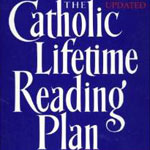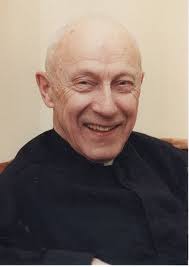Fr John Hardon's Catholic Lifetime Reading Plan

Father John Hardon SJ, Servant of God, 1914-2000, was a great man. With parents like his, it's no wonder.
When he was still an infant, his father, who was a construction worker, was killed in a workplace accident. He apparently sacrificed his own life to save the lives of his colleagues.
To honour her husband's memory, and the heroism of his death, Mrs Hardon resolved she would never remarry. So she scrimped and saved and struggled to support herself and her young son. As often happens, material poverty and solid faith produced spiritual riches.
Fr Hardon's earliest memory is accompanying his mother on all-night vigils before the Blessed Sacrament. He would be tucked up, asleep on a pew, and wake occasionally to find his mother always in the same position — kneeling next to him, head bowed in adoration, deep in prayer.
Some Lutheran schoolgirls boarded with the Hardons, which provided some income. When he was still young, John demanded to know why they got to eat meat on Friday, and he did not. Mrs Hardon discreetly raised the issue with the girls and their parents. The girls would have to adopt the Catholic practice, or find somewhere else to live. The girls wished to stay, and their parents agreed. The girls were like sisters to John, whom he loved and admired. He attributed his early positive exposure to the Lutheran faith to a lifelong interest in ecumenism, long before it was mainstream.
After his ordination, he was sent to Rome to study theology, and he became an expert in Protestantism and in the oriental religions. Fr Hardon was a hard worker, a clear thinker, and a brilliant one at that. From what I've read, it could be fair to say that he is the English-speaking world's answer to Joseph Ratzinger. By that I mean: Pope Benedict is the greatest theologian alive today, and the outstanding Catholic thinker of his generation. What can be said of Ratzinger at a universal level, may be said of Fr Hardon in the smaller pond of the Anglosphere.

Fr John Hardon SJ, Servant of God
Unfortunately, Fr Hardon was a casualty of the culture wars which raged throughout the post-conciliar Church. He was deemed to be too conservative and divisive by his superiors, banned from teaching, and effectively exiled. (That happened to many Jesuits in the 80s and 90s. Pope Francis suffered a similar fate in the decade following his term as Argentine superior general. It was only his episcopal appointment which lifted him from obscurity.) Nonetheless, Fr Hardon's marginalisation in America didn't inhibit fruitful collaboration with three popes.
With Pope Paul VI, Fr Hardon produced The Catholic Catechism (1975), which was the normative English-language catechetical text until the Holy See produced a definitive Catechism of the Catholic Church in 1992. (Fr Hardon contributed to that project too.) When Pope John Paul II asked Mother Teresa to expand her ministry to the poor to include catechesis and evangelisation, he referred her to Cardinal Ratzinger. Ratzinger, in turn, referred Mother Teresa to Fr Hardon, who worked closely with the Missionaries of Charity for many years, developing catechetical means which are still in use.
Apart from his scholarly virtues, Fr Hardon was by all accounts a holy priest. He had a deep devotion to the Blessed Sacrament, which isn't surprising in view of his mother's example. He was widely sought to lead retreats, hear confessions, and minister spiritual direction. His cause for canonisation was opened in 2005.
Fr Hardon's scholarship, his catechetical expertise, and his interior life conspire to recommend, I think, his Catholic Lifetime Reading Plan (Amazon listing). This book-length plan was published in 1989, and it's not so much a list of books as it is a list of 104 authors he recommends Catholics read.
I ordered this book several weeks ago, but I'm still waiting. I'm looking forward to learning why Fr Hardon recommends the authors he lists. He profiles each author in two or three pages, and includes their most recommended writing. Apparently the book also includes an exhaustive bibliography, with the details of all the significant works of each author. In the meantime, I've made do with the bare bones: names of the authors and the books Fr Hardon especially recommends.
You can download the document, or read it online:
No comments:
Post a Comment